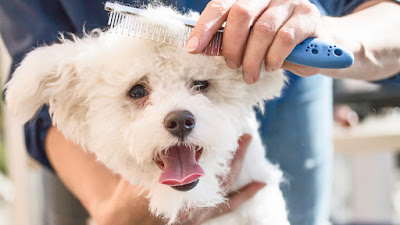Preventing flea bites on puppies is crucial to ensure their health and well-being. Fleas are tiny parasites that can cause discomfort, irritation, and even transmit diseases to our beloved furry friends. As pet owners, it is essential to take proactive measures to safeguard our puppies from these pesky creatures. By implementing effective preventative strategies, we can create a safe and flea-free environment for our puppies to thrive.
Preventing Flea Bites on Puppies: Regular Grooming and Bathing
Regular grooming and bathing play a significant role in preventing flea bites on puppies. Grooming sessions provide an opportunity to thoroughly inspect your puppy's fur for any signs of fleas or flea dirt. Brushing their coat helps to remove any existing fleas and their eggs. Additionally, bathing your puppy with a mild, flea-repellent shampoo can effectively eliminate fleas and provide relief from itching and irritation.
When grooming your puppy, use a fine-toothed flea comb to detect any fleas hiding in their fur. Start from the head and carefully comb through the entire body, paying extra attention to areas like the neck, armpits, and groin. If you spot any fleas or flea dirt, immediately dispose of them in soapy water to prevent reinfestation.
Bathing your puppy with a flea-repellent shampoo should be done according to the recommended frequency for their age and breed. Choose a shampoo that is specifically formulated for puppies and consult your veterinarian for guidance. During the bath, thoroughly lather the shampoo into your puppy's coat, making sure to reach all areas. Leave the shampoo on for the recommended duration before rinsing it off completely. This process not only cleanses your puppy's skin and fur but also helps to kill any fleas present.
After bathing, dry your puppy thoroughly with a towel or a low-heat blow dryer. Ensure that their fur is completely dry, as dampness can attract fleas. Additionally, consider using a flea preventive product recommended by your veterinarian to provide ongoing protection against fleas and ticks.
By incorporating regular grooming and bathing into your puppy's routine, you can effectively prevent flea bites and keep your furry friend happy and healthy.
Preventing Flea Bites on Puppies: Environmental Control
In addition to regular grooming and bathing, implementing effective environmental control measures is essential for preventing flea bites on puppies. Fleas can survive and reproduce in various areas of your home and yard, so it is crucial to target these areas to eliminate fleas and prevent their return.
Start by thoroughly cleaning and vacuuming your home, paying close attention to areas where your puppy spends most of their time. Vacuuming not only removes adult fleas but also helps to eliminate their eggs and larvae. Remember to empty the vacuum bag or dispose of the contents in a sealed bag to prevent fleas from reinfesting your home.
Washing your puppy's bedding, blankets, and toys regularly is also important. Fleas can hide in these items, so washing them with hot water and detergent can help eliminate any fleas or eggs present. If possible, dry these items in high heat to further ensure flea elimination.
For outdoor areas, such as the backyard or patio, consider treating the environment with appropriate flea control products. There are various options available, including sprays, powders, and granules that are specifically designed to target fleas and prevent their infestation. Follow the instructions provided on the product label and take necessary precautions to protect your puppy during the treatment process.
It is also essential to keep your yard clean and free from debris, as fleas thrive in cluttered environments. Regularly mow the lawn, trim bushes, and remove any leaf litter or standing water. These actions help to eliminate potential breeding grounds for fleas and reduce the risk of flea bites on your puppy.
If you have other pets in the household, make sure they are also protected against fleas. Regularly administer flea preventive treatments as recommended by your veterinarian, as a flea-infested pet can introduce fleas into the environment and expose your puppy to them.
By implementing these environmental control measures, you can create a flea-free environment for your puppy and minimize the risk of flea bites.
Preventing Flea Bites on Puppies: Regular Veterinary Care
Regular veterinary care is a crucial aspect of preventing flea bites on puppies. Your veterinarian can provide guidance on flea preventive products, perform thorough examinations, and address any flea-related concerns you may have.
During your puppy's routine veterinary visits, the veterinarian will conduct a comprehensive examination, including a thorough inspection of their coat and skin. They can identify any signs of flea infestation or flea-related dermatitis and recommend appropriate treatment options.
Your veterinarian can also recommend the most suitable flea preventive products for your puppy. Several alternatives are accessible, encompassing topical remedies, oral drugs, and collars. These products help to repel fleas, prevent infestations, and kill any existing fleas on your puppy.
It is important to follow your veterinarian's instructions and administer flea preventive treatments as directed. They will provide guidance on the appropriate dosage, frequency, and duration of use. Remember, using flea preventive products designed for adult dogs on puppies can be dangerous, so consult your veterinarian for the safest options for your little one.
In addition to flea preventive measures, your veterinarian may recommend other treatments, such as medicated shampoos or sprays, to alleviate itching and irritation caused by flea bites. They can also advise on proper nutrition and supplements that promote a healthy coat and skin, making your puppy less susceptible to flea infestations.
Regular veterinary care also includes scheduled vaccinations, which protect your puppy from various diseases. Fleas can transmit certain diseases, such as Bartonellosis and tapeworm infections, so ensuring that your puppy is up to date on vaccinations is crucial for their overall health and flea prevention.
By maintaining regular veterinary visits and following your veterinarian's recommendations, you can ensure that your puppy receives the necessary preventive care to keep them safe from flea bites.
